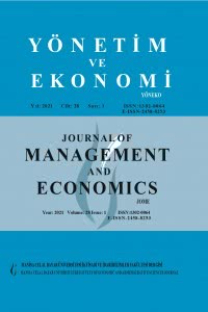Yeni Nesil Kurumsal Kaynak Planlaması Sistemi'nin Yönetim Muhasebesi Açısından Değerlendirilmesine Yönelik Bir Araştırma
A Research on the Evaluation of New Generation Enterprise Resource Planing (ERP) from the Perspective of Management Accounting
___
- ARIKBOĞA Dursun, KAYA İdil (2000); Ülkemizde Kurumsal Kaynak Planlaması-ERP Kullanımı ve Muhasebe Eğitiminden Beklentiler,19. Muhasebe Eğitimi Sempozyumu,18-20 Mayıs 2000,134-147.
- CAGLİO Ariela(2003), Enterprise Resource Planing Systems and Accountatants: Towards Hybridization?,European Accounting Review, 12:1,134.
- CHANG Hsin Hsin (2006), Technical and Management Perceptions of Enterprise Information System Importantance, Implementation and Benefits, Info Systems, 266.
- DAVENPORT T.H (2000) Mission Critical, Realizing the Promise of Enterprise Systems, Boston MA: Harvard Business School Pres,2.
- EDSON Luiz Riccio(2003), Effects of ERP in the Accountants Function Case Studies in Multinational Companies,2.
- FORNADEL Joe (2003), Getting it Right with ERP II, Intelligent Enterprise, Internet Version, August 7, 1
- GRANLUND Markus and MALMİ Teemu(2002), Moderate impact of ERPS on management accounting: a lag or permanent outcome?, ,Management Accounting Research, 13, 305.
- GRANT David,HALL Richard, Wailes Nick and Wright Christopher; The False Promise of Technological Determinism(2006), The Case of Enterprise Resource Planing Systems, New Techonology, Work and Employment, 21:1,3.
- GÜRSOY Cudi Tuncer(1999) , Yönetim ve Maliyet Muhasebesi,2.Baskı, Eylül,13.
- KALMAN Selin (2007), İş süreçlerinizi başarıya taşıyın: Kurumsal Kaynak Planlama, BThaber, 16.
- KAVURMACI Umut, KOMÇEZ Yücel (2003), ITB, ERP’de Desteksiz Kalabilirsiniz, Ocak ,14.
- PINAR İbrahim, ERDEM Serdar Kerim (2002); Kurumsal Kaynak Planlaması(ERP) Kullanıcısı İşletmelerin Memnuniyetlerini Ölçmeye Yönelik Bir Araştırma, İstanbul Üniversitesi Dergisi,Nisan, 5.
- SCAPENS R.W & JAZAYERİ M. (2003), ERP Systems and Manegement Accounting Change: Appourtunities or İmpacts? A Research Note, Europen Accounting Review, Volume 12, Issue 1, 201
- SCAPENS Robert ,W., JAZAYERİ Mostafa (2002), ERP Systems and Management Accounting Change: Opportunities or İmpacts? A Research Note; European Accounting Review,12:1,220.
- TİN Yu Ho(2006), Master’s Thesis in Accounting, Swedish School of Economics and Business Administration, 46.
- www. Nexum.com. tr/Kurumsal Planlama, Bütçeleme ve Raporlamada Örnek Çalışma: Teknosa Bütçeleme Projesi,12.05.2005.
- YEGÜL Mustafa Fatih, TOKLU Bilal (2004); Türkiye’de ERP Uygulamaları; Gazi Üniversitesi Endüstri Mühendisliği Dergisi, Ocak-Şubat-Mart Sayı:1,8.
- ISSN: 1302-0064
- Yayın Aralığı: 4
- Yayıncı: Manisa Celal Bayar Üniversitesi İktisadi ve İdari Bilimler Fakültesi
Verimlilik, Ücretler ve İşsizlik oranları Arasındaki İlişkinin Analizi: Türkiye Örneği
Emrah İsmail ÇEVİK, Vedat PAZARLIOĞLU
“Vergi Aflarının Vergi Mükelleflerinin Tutum ve Davranışları Üzerindeki Etkisi”
Türkiye'de Turizm Sektörü Teşviklerinin Değerlendirilmesi
“İbni Haldun'un Gözüyle Kamu Maliyesi Yaklaşımı”
2000-2006 Döneminde Türkiye'de Faaliyet Gösteren Sigorta Şirketlerinin Etkinlik Değerlendirmesi
“Sürdürülebilir Kalkınmada İşletmenin Rolü: Kurumsal Vatandaşlık”
Muammer SARIKAYA, F.Zişan KARA
“Türkiye'de Kredi Kartı Kullanımını Etkileyen Faktörleri Belirlemeye Yönelik Bir Model Çalışması”
